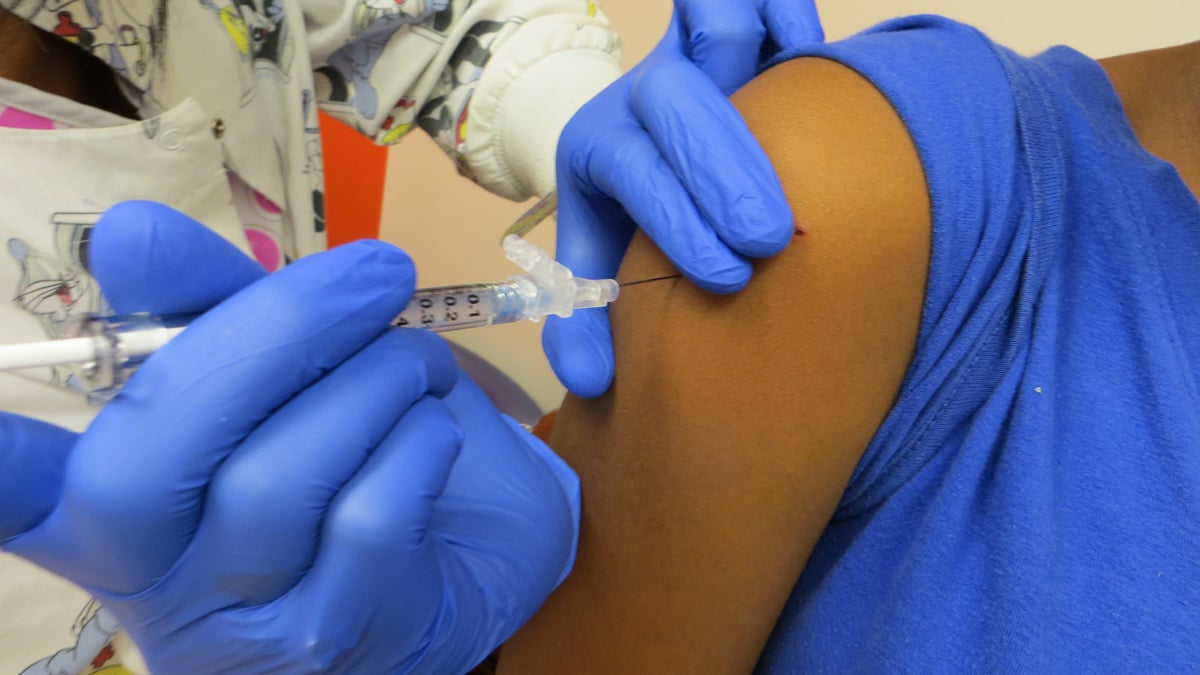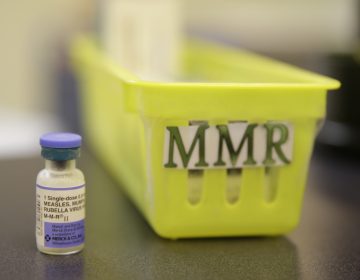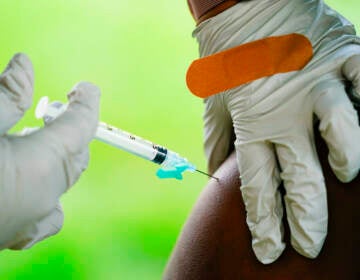Lawmakers move to end religious exemption for mandatory vaccinations
The New Jersey Assembly passed a measure late last week removing the religious exemption as a reason parents can refrain from having their children vaccinated.

The Centers for Disease Control and Prevention recommends the vaccine against the Human papillomavirus for girls and boys age 11 or 12. (Taunya English/The Pulse)
This story originally appeared on NJ Spotlight.
—
The New Jersey Assembly passed a measure late last week removing the religious exemption as a reason parents can refrain from having their children vaccinated.
While the measure was just an amendment to a larger bill on mandatory immunization (A-3818), it signaled a new position state officials may be taking in the controversial vaccination debate.
Under current New Jersey law, students in public and private school must be vaccinated for a list of diseases unless they claim that doing so would be medically risky or that it violates a religious tenet in which they believe. But with a measles outbreak near Portland, OR, where at least 44 people in that state and Washington have fallen ill in recent weeks, and a measles flare-up in nearby Ocean County last year, calls for mandatory vaccination have become more vociferous.
“I think many, including those who availed themselves of it, have been uncomfortable with the government intruding into the religious space,” said health committee chairman Herb Conaway Jr. (D-Burlington), who sponsored the bill and the amendment. “I was convinced when you took everything together, the uncomfortable nature of asking someone about their religious tenets, and the difficulty government has in deciding whether those religious tenets are bona fide, that it would be simpler to remove the religious exemption, in furtherance of the goal of near universal mandatory vaccination.”
Religious and public-health concerns
When asked whether removing the exemption was more about public-health concerns than about treading on religious rights, Conaway, a physician for whom mandatory vaccination legislation has been a long-time priority, said it’s both.
“It’s no secret I believe public health is critically important to protecting the lives of children and the public at large. But I also believe strongly in the First Amendment, and I think the government should tread very lightly — if at all — regarding religion and religious tenets,” Conaway said. “I think this bill and the amendment puts us on the right path with respect to the demands of public health, and our long tradition of noninterference with religion.”
The religious exemption isn’t dead just yet. The bill still has some hefty hurdles to get over: It must pass the full Assembly, and the Senate version of the bill, S-2173, would also have to be amended and passed. Calls to the original bill’s sponsors, Sens. Loretta Weinberg (D-Bergen) and Joe Vitale (D-Middlesex), were not returned. It’s unclear whether they would support Conaway’s amendment.
But putting an end to the religious exemption certainly has its supporters, particularly among public-health officials.
Vaccination: a social contract
“It is a commonsense bill. In New Jersey, we’re seeing diseases that we haven’t seen in decades, like the measles outbreak we had in Ocean County a few months ago,” said Megan Avallone, president of the New Jersey Association of County and City Health Officials. “If you don’t want to vaccinate your child, you don’t have to, but the social contract is, if you want your child to attend school, then that child has to be vaccinated to protect the other students at that school.”
The goal of the original bill before it was amended — and its companion bill in the Senate — was to raise the bar on what constitutes a religious exemption, to assure that those applying for it had legitimate religious claims. Under current law, all that’s needed is a signed statement from a parent stating immunization interferes with a student’s religious rights.
The new bill originally required parents or guardians to submit documentation explaining how immunization conflicts with their religious tenets. That submission would have to have been notarized and include a statement that the beliefs are ongoing, not just adopted to avoid vaccination, and that they are based on religious, not moral or philosophical, concerns or fears about the shots themselves. With the amendment, the Assembly bill will only allow medical exemptions: Parents can obtain a written statement from a health professional explaining a medical reason their child should be exempted from mandatory vaccination.
Avallone said the problem in New Jersey was that 98 percent of the religious exemptions requested are really “philosophical” exemptions, meaning they’re a way for people opposed to mandatory vaccination to achieve their goals. She cites the flu vaccine as one example: Parents with children in preschool or daycare will claim a religious exemption from having their children inoculated for the flu and yet they don’t claim a religious exemption for other diseases.
“For sure, there are true religious exemptions. But in New Jersey, as the bill points out, we currently have a philosophical exemption that we’re calling a religious exemption,” she said. “The first draft of the bill was really just to tighten those loopholes to make it a true religious exemption … rather than just writing on a sheet of looseleaf paper that this vaccine is against my belief.”
Religious exemptions on the rise
Indeed, the number of parents using the exemption, while not large, has been ticking up. The Center for Disease Control found that nationwide, 2.2 percent of kindergarteners received an exemption to the mandatory vaccine policy in 2017-2018 — the vast majority for religious or other reasons, not medical concerns — up from 2.0 percent the previous school year. New Jersey’s exemption rate rose to 2.2 percent in 2017-2018 from 1.9 percent the year before. Some public-health advocates believe these increases in unprotected children reflect a growing use of religious and personal exemptions, which are permitted in some form in most states.
“This bill is a clear declaration of our state’s commitment to safeguarding the health and wellbeing of all children and families in New Jersey, nothing more and nothing less. As such, we steadfastly advocate for its support by all members of the legislature,” said Michael Weinstein, director of the New Jersey Immunization Network, a coalition led by the New Jersey Chapter of the American Academy of Pediatrics (NJAAP) and the New Jersey Academy of Family Physicians (NJAFP). “This bill is not designed to infringe on religious freedom or parental choice; rather, it is designed to protect our children from vaccine-preventable diseases.”
Erosion of personal rights
Those who oppose mandatory vaccination don’t see it that way, and they view the potential abandonment of the religious exemption as a significant erosion of New Jerseyans’ personal rights.
“Parents deserve the right to full informed consent when choosing to have their children inoculated. Mandatory vaccination laws present a situation that interferes with a person’s ability to be an active participant in their medical decisions,” Sarah Lane, a member of New Jersey Coalition for Vaccination Choice.
Most people who have concerns surrounding the use of vaccination are not opposed to the entire practice, she said. They just want to participate fully in the medical decisions made for their children and themselves. She saw it as ironic that legislators can support adult use of marijuana or allowing people to choose to end their lives with pharmaceuticals, which are issues of personal choice and freedom, and yet they don’t extend that freedom to the vaccination debate.
“People who use the religious exemption to opt out of vaccinations do so because they have deeply held beliefs that injection into their body or the body of their child is not right for them,” she said.
She also said the list of mandated vaccines has risen dramatically in the last 30 years. Currently, babies are recommended to receive 26 doses of vaccines before their first birthday. Children are recommended to receive 72 doses before the age of 18. And some of those vaccinations are for infections that have never been and will never be public-health concerns, said Lane, an optometrist who works with people who suffer with a variety of neurological conditions.
“Babies are required to receive five doses of the tetanus vaccine before 18 months of life,” she said, “and yet babies are not at risk for this infection.” She added that the same holds for hepatitis B, a vaccine babies receive hours after birth in the hospital, and yet it is a sexually transmitted disease. The only reason a baby would be at risk for hep B is if their mother had tested positive, and yet even when the mother tests negative, the babies are still inoculated with the vaccine three times in the first six months of their lives.
“This is what it means to ‘vaccinate your child.’ The conversation surrounding vaccination choice is far more complicated than a focus on measles and polio,” she said.
Hot button
Childhood immunization is always a hot button, pitting health officials eager to expand New Jersey’s immunization rate — already one of the nation’s highest — against religious advocates, parents, and others who insist vaccines do more harm than good, despite the limited scientific evidence. Most studies have shown that inoculations, which involve weakened versions of a disease and have been used for centuries, help prevent the spread of potentially deadly infections, reduce hospitalizations, and save money over time.
The issue is fraught with anger and frustration. When the Assembly health committee approved legislation last spring to limit what some believe is excessive use of the religious exemption, vaccine opponents called the move “treasonous” and said support for the measure would land legislators in hell. Youngsters must be immunized against more than a dozen diseases before attending New Jersey schools. When the measure passed by a vote of 7-2 — with three members not voting — the room erupted in anger, with audience members calling the vote shameful. “May God have mercy on your souls,” one opponent yelled. “I hope you all have nightmares,” yelled another.
But late last week, Assembly members Conaway and Johnson decided to remove the religious exemption altogether, saying they didn’t want to be in the business of deciding whether someone’s religious beliefs were valid.
“One of the themes throughout the committee meeting was the appropriateness of the government asking someone about their religious tenets,” Conaway said. “I think this will provide a much clearer direction for the public and the government, which has to (oversee) the vaccination program,” Conaway said. “It’s much easier for the government to make a determination based on the findings of a physician rather than trying to divine whether or not a person’s religious tenets regarding vaccination are bona fide or not.”
WHYY is your source for fact-based, in-depth journalism and information. As a nonprofit organization, we rely on financial support from readers like you. Please give today.




